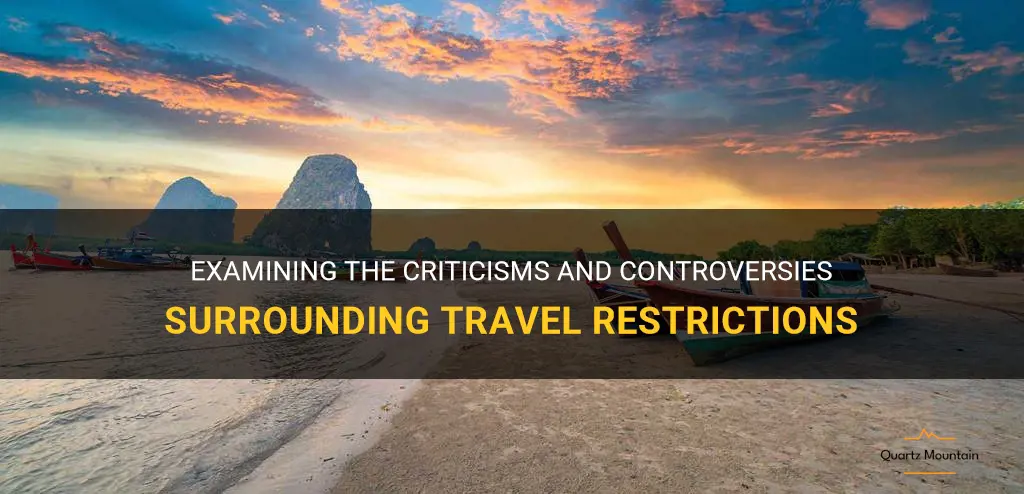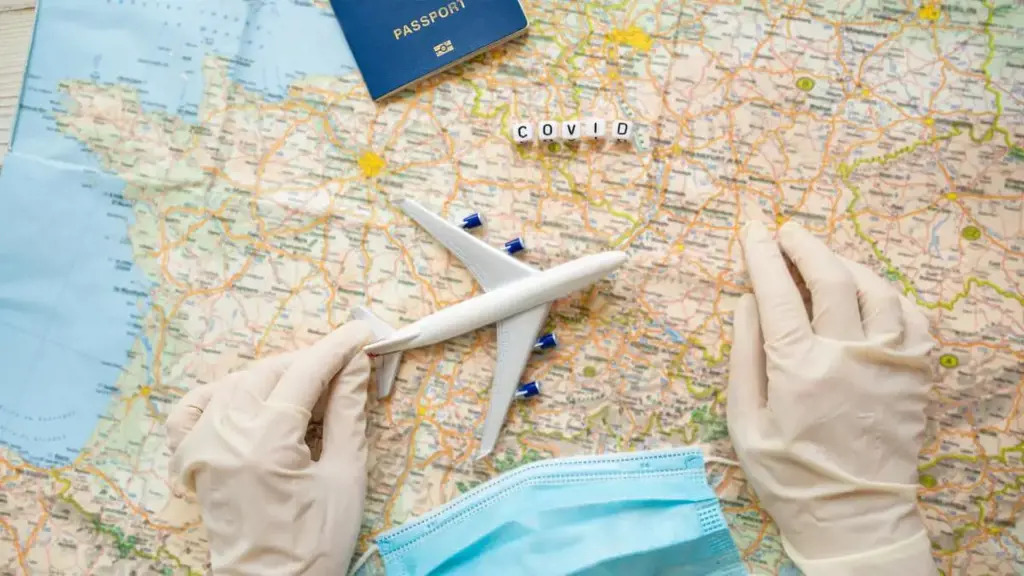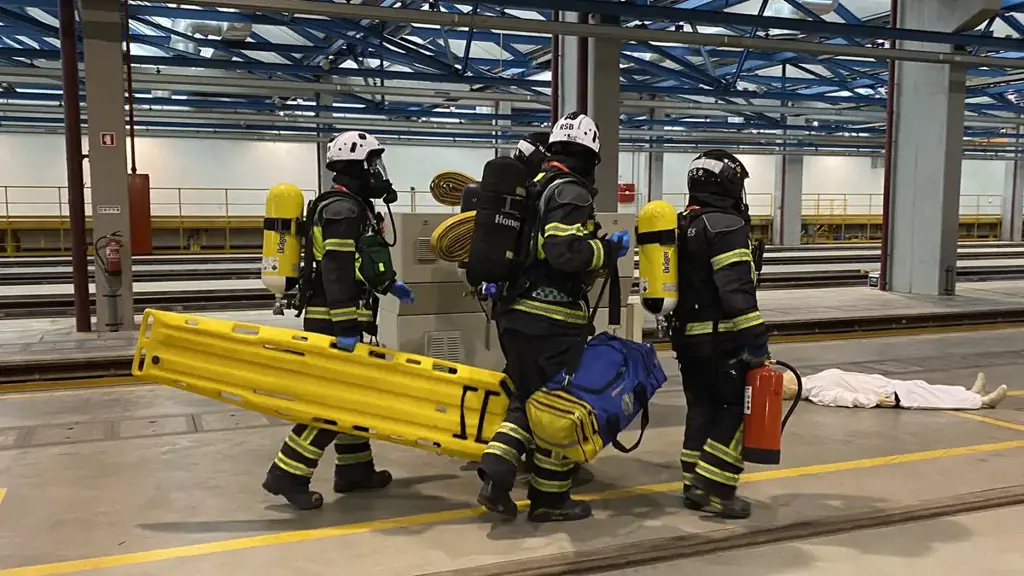
Travel restrictions have become a hotly debated topic in recent years, with critics arguing that they not only limit personal freedom but also have negative economic and social consequences. These restrictions, imposed by governments to protect their citizens from potential threats such as terrorism or pandemics, have faced backlash from those who believe that they undermine the principles of globalism and discourage cultural exchange. While some argue that travel restrictions are a necessary evil, others question their effectiveness and question whether they do more harm than good.
| Characteristics | Values |
|---|---|
| Ineffectiveness | Critics argue that travel restrictions are ineffective in preventing the spread of diseases or controlling outbreaks. They claim that viruses can still spread through other means like local transmission or asymptomatic carriers. |
| Discrimination | Some critics argue that travel restrictions unfairly target certain countries or regions based on stereotypes or biases. They claim that these restrictions can contribute to xenophobia and discrimination. |
| Economic impact | Travel restrictions can have a significant negative impact on the economy, particularly in industries such as tourism, hospitality, and transportation. Critics argue that these restrictions can lead to job loss, business closures, and overall economic downturn. |
| Human rights concerns | Critics raise concerns about human rights violations associated with travel restrictions, especially when they involve mandatory quarantines, surveillance measures, or restrictions on personal freedoms. They argue that these measures can infringe on individuals' rights to privacy and movement. |
| Lack of coordination | Some critics argue that travel restrictions are often implemented without proper coordination or consultation with other countries or international organizations. This lack of coordination can lead to confusion, inconsistent measures, and hinder global efforts to address public health emergencies. |
| Disruption of essential services | Critics point out that travel restrictions can disrupt essential services such as medical supplies, humanitarian aid, and international cooperation in addressing health emergencies. They argue that these restrictions can hinder the global response and access to critical resources. |
| Psychological and social impact | Travel restrictions can have psychological and social impacts, including increased anxiety, fear, and social isolation. Critics argue that these measures can negatively affect mental health and well-being, especially for individuals separated from their families or unable to travel for personal reasons. |
| Diversion of resources | Some critics argue that implementing and enforcing travel restrictions can divert resources and attention away from other effective public health measures, such as testing, contact tracing, and healthcare capacity building. They claim that resources should be allocated to strategies that have proven to be more effective in controlling outbreaks. |
What You'll Learn
- What are some common criticisms of travel restrictions implemented by governments?
- How do travel restrictions impact international tourism and the economy?
- Are travel restrictions an effective method for preventing the spread of diseases or threats?
- Do travel restrictions disproportionately affect certain groups of people or countries?
- What alternative approaches to travel restrictions have been proposed to address global health or security concerns?

What are some common criticisms of travel restrictions implemented by governments?

Travel restrictions have become an increasingly common measure implemented by governments around the world in response to public health crises, security threats, or other unforeseen circumstances. While these restrictions may be deemed necessary by some, they are not without their critics. Here are some common criticisms of travel restrictions implemented by governments.
- Disruption of personal freedom and global mobility: One of the main criticisms of travel restrictions is that they infringe upon an individual's basic right to freedom of movement. Critics argue that restrictions limit people's ability to travel freely and inhibit their personal choices. They also argue that such restrictions hinder global mobility and impede cultural exchange, which can have negative consequences for social and economic development.
- Economic impact: Travel restrictions can have severe economic consequences, particularly for industries heavily reliant on tourism and international business. Critics argue that such restrictions can lead to job losses, business closures, and a decline in economic growth. For example, in 2020, the global tourism industry suffered significant losses due to travel restrictions imposed in response to the COVID-19 pandemic.
- Ineffectiveness: Critics of travel restrictions question their effectiveness in preventing the spread of diseases or mitigating security threats. They argue that such restrictions may provide a false sense of security and may not necessarily result in a significant reduction in transmission rates or prevent potential security risks. Some critics believe that alternate strategies, such as robust testing and contact tracing, might be more effective in addressing these concerns.
- Lack of coordination and inequality: Another criticism is the lack of coordination and inconsistency among governments when implementing travel restrictions. The absence of a unified approach can create confusion and lead to disparities in the treatment of travelers. This lack of coordination can also exacerbate global inequalities, as some countries may have the resources and infrastructure to enforce strict travel restrictions, while others may struggle to do so.
- Humanitarian concerns: Travel restrictions can have a disproportionate impact on vulnerable populations, such as refugees and those seeking asylum. Critics argue that such restrictions can prevent individuals from accessing safety, health services, and other essential resources. Furthermore, restrictions may hinder humanitarian aid efforts and limit support for regions facing crises or natural disasters.
While travel restrictions can serve a purpose in certain situations, it is important to consider and address the criticisms they face. Governments should carefully balance the need to protect public health and security with the potential negative consequences of travel restrictions. Alternative approaches, such as targeted testing and contact tracing, should be explored to ensure a more effective and equitable response to global challenges.
What You Need to Know About Travel Restrictions to Wisconsin
You may want to see also

How do travel restrictions impact international tourism and the economy?

In recent months, travel restrictions have become a common topic of discussion as countries across the world grapple with the ongoing COVID-19 pandemic. These restrictions, put in place to control the spread of the virus, have had a significant impact on international tourism and the global economy as a whole.
International tourism has been heavily affected by travel restrictions. Many countries have implemented strict border controls, including mandatory quarantines, testing requirements, and complete bans on non-essential travel. These measures have made it difficult, if not impossible, for tourists to visit their desired destinations. As a result, the global tourism industry has experienced a sharp decline in revenue and job losses.
According to the United Nations World Tourism Organization (UNWTO), international tourist arrivals dropped by 73% in 2020 compared to the previous year. This represents a loss of $1.3 trillion in export revenue worldwide. The impact is particularly significant for countries heavily reliant on tourism, such as small island nations and developing economies. For these countries, tourism is often a major driver of economic growth and job creation.
Additionally, the travel restrictions have also had a ripple effect on related industries such as hospitality, transportation, and retail. Hotels, restaurants, and airlines have seen a drastic decrease in bookings and revenue, leading to layoffs and business closures. The loss of tourism also affects local economies, as tourists typically spend money on accommodations, dining, shopping, and entertainment.
The impact of travel restrictions goes beyond the tourism industry alone. The global economy as a whole has suffered as a result. International trade has been disrupted, with restrictions on travel affecting the movement of goods and services. Manufacturing, supply chains, and global businesses have been impacted, leading to decreased productivity and economic growth.
Moreover, travel restrictions have also affected people's livelihoods and quality of life. Many individuals rely on international travel for work, education, family visits, and leisure. The inability to travel freely has caused personal and emotional distress, as well as economic hardships for those who depend on tourism-related industries.
As the world continues to grapple with the COVID-19 pandemic, travel restrictions remain a necessary measure to control the spread of the virus. However, finding a balance between public health and economic recovery is crucial. Governments and organizations are exploring strategies such as the implementation of vaccine passports, testing protocols, and travel bubbles to safely revive international tourism while keeping the virus under control.
In conclusion, travel restrictions have had a profound impact on international tourism and the global economy. The decline in tourist arrivals, loss of revenue, and job losses in the tourism industry have been significant. The restrictions have also affected related industries and the overall global economy. As the world moves forward, finding ways to safely resume international travel will be crucial for the recovery of the tourism industry and the global economy.
Understanding the American Travel Restrictions: A Comprehensive Map
You may want to see also

Are travel restrictions an effective method for preventing the spread of diseases or threats?
Travel restrictions have become a common sight during times of global pandemics and heightened security threats. Governments around the world often implement travel restrictions as a means to prevent the spread of diseases or threats. However, the effectiveness of these measures is a topic of debate among experts and policymakers.
On one hand, travel restrictions can be an effective method for preventing the spread of diseases or threats. By limiting the movement of people across borders, authorities can control the entry and exit of potentially infected individuals. This can help contain the spread of a disease within a particular region and prevent it from reaching new areas. For example, during the COVID-19 pandemic, many countries implemented travel restrictions to limit the transmission of the virus from heavily affected regions to areas with fewer cases.
Furthermore, travel restrictions can provide authorities with an opportunity to identify and screen individuals who may pose a threat to national security. By implementing stringent immigration policies and conducting thorough background checks, governments can prevent potential terrorists or criminals from entering their countries. This can help maintain the safety and security of the population.
However, travel restrictions also come with their share of limitations and drawbacks. One of the main concerns is the potential negative impact on the economy. The tourism and travel industry is a significant contributor to the global economy, and restrictions on travel can have severe consequences for businesses and livelihoods. Countries heavily reliant on tourism, such as those in the Caribbean or Southeast Asia, may face significant economic losses if travel restrictions are in place for an extended period.
Additionally, travel restrictions may not be foolproof in preventing the spread of diseases or threats. While they can help control the entry of potentially infected or dangerous individuals, they cannot guarantee complete prevention. Diseases can still be transmitted within a region through local transmission, and threats can manifest through other means apart from travel. Therefore, relying solely on travel restrictions may not be sufficient in addressing the root causes of diseases or threats.
Moreover, travel restrictions can also pose ethical dilemmas. They may infringe upon individuals' rights to freedom of movement and personal liberties. Human rights organizations and civil liberties advocates often argue that travel restrictions should be proportionate, necessary, and based on scientific evidence to avoid unnecessary harm and discrimination.
In conclusion, travel restrictions can be an effective method for preventing the spread of diseases or threats, but they also have limitations and drawbacks. While they can help contain the spread of diseases or prevent potential threats, they may negatively impact the economy, may not guarantee complete prevention, and raise ethical concerns. It is important for policymakers to carefully consider the potential benefits and trade-offs of implementing travel restrictions, taking into account the specific circumstances and risks associated with the disease or threat at hand.
An Overview of Travel Restrictions from Germany to the USA: What You Need to Know
You may want to see also

Do travel restrictions disproportionately affect certain groups of people or countries?

Travel restrictions have become a common measure implemented by countries around the world in response to the COVID-19 pandemic. While these restrictions are meant to control the spread of the virus, there is a growing concern that they may disproportionately affect certain groups of people or countries.
One group that is particularly impacted by travel restrictions is international travelers, especially those from countries that are deemed high-risk or have high rates of COVID-19 infection. These individuals may face stricter entry requirements, such as mandatory quarantine periods or proof of vaccination, which can be challenging and costly to fulfill. Moreover, they may also face a higher likelihood of being denied entry altogether, leading to disrupted travel plans and financial losses.
Another group that may be disproportionately affected is those who depend on travel for their livelihood. This includes people working in the tourism industry, such as hotel and restaurant employees, tour guides, and transportation providers. With travel restrictions in place, these individuals experience a significant loss of income and job insecurity. This is especially true for those in developing countries where tourism plays a crucial role in the economy.
Furthermore, travel restrictions can also impact students studying abroad or individuals seeking medical treatment in a different country. These individuals may be unable to access educational opportunities or necessary medical care due to travel restrictions, which can have long-term implications for their future.
Geographically, certain countries may bear a heavier burden of travel restrictions than others. Developing countries heavily reliant on tourism income may face economic hardships as travel restrictions deter visitors. This can exacerbate existing inequalities between developed and developing nations, as the latter often have fewer resources and financial support to weather the impact of travel restrictions.
Moreover, travel restrictions also have implications for global cooperation and unity. The ability to travel and exchange ideas and experiences plays a crucial role in fostering mutual understanding and collaboration among nations. Restrictions on travel can hinder cross-cultural dialogue and limit opportunities for international collaboration in areas such as research, academia, and business ventures.
In conclusion, travel restrictions in response to the COVID-19 pandemic can indeed disproportionately affect certain groups of people or countries. International travelers, individuals dependent on travel for their livelihood, students studying abroad, and those seeking medical treatment may face significant challenges and disruptions. Additionally, developing countries heavily reliant on tourism may suffer economically. The impact of travel restrictions goes beyond immediate inconveniences, as they can hinder global cooperation and unity. As the world navigates through the pandemic, it is crucial to find a balance between controlling the spread of the virus and mitigating the adverse effects of travel restrictions on vulnerable groups and countries.
Exploring Machu Picchu: Navigating the Travel Restrictions
You may want to see also

What alternative approaches to travel restrictions have been proposed to address global health or security concerns?

In recent years, travel restrictions have become a common tool used by governments to address global health or security concerns. However, there have been alternative approaches proposed that aim to achieve the same goals while minimizing the negative impact on individuals and communities.
One alternative approach is to focus on risk assessment and management instead of imposing blanket travel restrictions. This entails identifying high-risk individuals or groups and implementing targeted measures to mitigate the risks they may pose. For example, rather than banning travel from a whole country, governments could implement strict screening procedures for travelers coming from regions with high incidence of infectious diseases.
Another proposed approach is to enhance international cooperation and information sharing. By working together, countries can share information about health or security threats, as well as coordinate efforts to address them. This could involve the establishment of international networks or platforms where countries can exchange data, collaborate on research, and implement joint response strategies.
Additionally, some experts argue that a more proactive approach to prevention and preparedness is needed. Instead of relying primarily on travel restrictions as a reactive measure, governments should invest in strengthening their healthcare systems, improving disease surveillance, and enhancing their ability to respond to emergencies. This could involve training healthcare professionals, stockpiling essential medical supplies, and establishing effective communication channels for rapid response.
Another alternative approach is to implement risk-based travel advisories instead of travel restrictions. This would involve providing travelers with comprehensive information about the risks they may encounter at a particular destination, allowing them to make informed decisions about whether or not to travel. By empowering individuals to assess and manage their own risk, governments can reduce the need for restrictive measures while still ensuring public health and safety.
Finally, some propose the use of technology and data-driven approaches to address health or security concerns. For example, implementing robust digital health passports or certification systems could allow for more targeted control measures, such as quarantining or testing only those individuals who pose a higher risk. Similarly, leveraging data analytics and artificial intelligence could help identify and respond to emerging threats more effectively.
In conclusion, while travel restrictions have become a common tool in addressing global health or security concerns, alternative approaches have been proposed to achieve the same goals while minimizing the negative impact on individuals and communities. These approaches include risk assessment and management, international cooperation and information sharing, prevention and preparedness, risk-based travel advisories, and the use of technology and data-driven approaches. By considering and implementing these alternatives, governments can strike a balance between public health and safety, and the need for international mobility and connectivity.
Navigating Nicaragua's Travel Restrictions: What You Need to Know
You may want to see also
Frequently asked questions
Travel restrictions are often criticized because they can have negative impacts on economies, industries, and individuals. By limiting travel, countries can experience a decrease in tourism, which can lead to a loss of revenue and jobs in the hospitality and tourism sectors. Additionally, travel restrictions can negatively affect individuals who rely on travel for family visits, work opportunities, or personal reasons.
Travel restrictions have been criticized for potentially violating certain human rights, such as the right to freedom of movement and the right to seek asylum. Critics argue that restricting travel can impede on these fundamental rights and inhibit people's ability to escape persecution, seek medical treatment, or reunite with their families. Certain travel restrictions, if not done in a proportionate and justified manner, can be seen as a violation of human rights.
Critics often argue for alternative approaches to travel restrictions when dealing with public health or security concerns. These alternatives could include implementing rigorous testing and quarantine protocols, as well as focusing on contact tracing and surveillance measures to mitigate the spread of diseases or track potential threats. By adopting these alternatives, countries can potentially achieve the same objectives as travel restrictions while minimizing the negative impacts on economies and individual rights.







